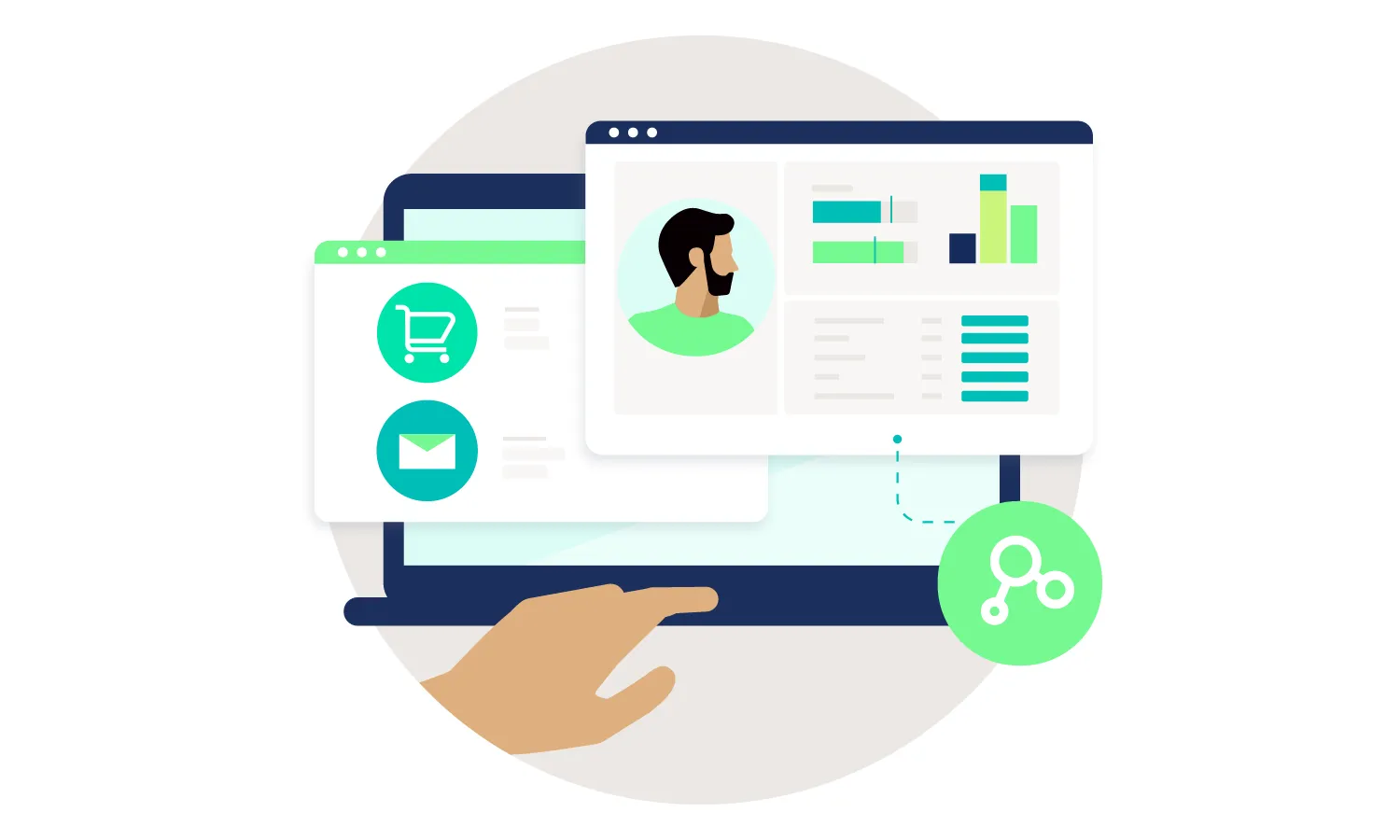July 6, 2021
CDP vs. CRM: What is the Difference Between a Customer Data Platform and a Customer Relationship Management Platform?
Businesses need to collect their customers' data for better customer insights and retargeting. And to achieve this, two main technologies are often used: Customer Relationship Management (CRM) and Customer Data Platforms (CDP).
These two technologies are highly ranked due to their effectiveness. However, they are often confused, and it can be difficult to decide which is right for you.
CRMs help manage direct customer relationships, while CDPs help manage customer data, as the names imply. But there's more to this. Here, we will discuss each option and compare them to highlight the differences.

What is a CDP?
According to the CDP Institute, a CDP is a software package that creates a unified and persistent database that is easy to access on other systems.
In other words, a CDP allows businesses to collect a huge amount of data from both online and offline sources, match it, merge it, and then combine it into a well-structured single customer view.
So the CDP:
- Ingests data from different sources (e.g., ecommerce, POS, email, web, social).
- Cleans, de-duplicates, and standardizes the data.
- Creates unified customer profiles.
- Shares the data with other retail systems.
For example, let's say you just launched a new website and you want to monitor how customers interact with it. You then plug in JavaScript snippets to collect data on the people who visit your pages.
The CDP will collect the website data and match it with the existing customer profile in the database. This allows you to know the users who visited your page and whether or not you have interacted with them before. While creating the profiles, the CDP combines data from all your systems including the CRM for better profile matching.
What is a CRM?
CRM software allows marketers to manage their customer relationships using the full contact history for every known customer. It collects data from different engagement channels (emails, calls, messages, social media, live chats, and so on), tracks sales, and stores the data.
The primary role of CRM software is to help businesses to develop, retain, and acquire new customers. It ensures that every step of the customer lifecycle goes well to keep the customer satisfied and improve overall business profits.
CRMs keep the following information regarding a customer:
- Overall purchase history.
- Personal information, like name and email.
- Purchasing behavior patterns (e.g. frequency of purchases).
By using CRM software, your business gets the chance to:
- Access the customer data with ease.
- Manage your marketing campaigns by quickly identifying your audience.
- Record any service issues.
- Increase your business productivity.
CDP vs CRM: The difference
So, what's the difference between these two solutions?
CRM software manages the entire contact history with every known customer. Originating from 1:1 sales workflows, most CRM systems now provide cross-channel contact history and servicing tools. However, the software does not store data for unknown customers.
So, you can rely on CRM software only when you need to strengthen your current relationship with customers.
Additionally, data collected by the CRMs cannot be viewed as a “single customer view,” because the system does not cleanse, combine, standardize or reduplicate the records. This could make it complicated for the business to understand their true, omnichannel relationship with customers.
On the other hand, CDPs combine, cleanse, standardize, and enrich your data into a complete single customer view. Described as "marketing's holy grail," CDPs improve the customer experience by giving every team the ability to self-serve insights and drive proactive, personalized engagement across channels.
The CDP identifies both old and new prospects to create a single profile view that can easily be moved into different systems for segmented and personalized targeting. Both CDP and CRM options are great, but you might find CDPs to be more advantageous because they allow easier data importation from other places or platforms.
Should you use a CDP even if you already use a CRM?
Yes. Using a CDP and a CRM together can create an incredible customer experience, improve customer satisfaction, and enable integrated tracking and engagement with customers.
If you already have a CRM, a CDP will still be important because:
- CRM data is not connected with critical sources (retail, online, partners), preventing omnichannel customer insights. A CDP consumes and analyzes all of your CRM data and combines it with other sources, like eCommerce, social, web/app, retail, and more, and creates a simplified, rolled-up view of each customer.
- The CDP enables customer segmentation, clustering, comparison on any attribute across all systems and channels, whereas this is not possible with a CRM.
- CRM providers generally integrate to a basic level with many systems, but not always easily, flexibly, or in real-time. They don’t usually integrate with competitors, or they'll offer it at substantial additional expense. A CDP, on the other hand, is agnostic in terms of the integrations and APIs available.
- CRMs are not designed to handle multiple data types like purchase history and web/app behavior, but CDPs can manage any type of data from any source.
As you plan to implement the best CDP and CRM technologies, we highly advise you to gather the basics first to get the best results. If your business is data-intensive and you plan to expand it in the future, a CDP will be helpful. It will help you collect the critical data of your prospects and customers as they visit your website, allowing you to get the whole truth about your customers. If you need help on how you can get started with Customer Data Platforms, reach out to Lexer.
Lexer is the CDP of choice for leading brands like Quicksilver, Igloo, Nine West, Rip Curl, Supergoop!, and more. As the only CDP built for retail, we help the world's most iconic brands drive incremental sales from improved customer engagement.
FAQs
Can a CDP replace my CRM entirely?
Not usually. CDPs and CRMs serve different purposes and work best together. CRMs excel at managing direct relationships, sales pipelines, and service tickets for known customers. CDPs excel at creating comprehensive customer intelligence and powering personalized marketing across all channels.
What data does a CDP have that a CRM doesn't?
CDPs include anonymous behavioral data (website visitors who haven't identified themselves), ecommerce transaction details, retail POS data, email engagement metrics, social media interactions, loyalty program activity, survey responses, and predictive attributes (churn risk, lifetime value predictions, next likely purchase).
What is a DMP?
A DMP (Data Management Platform) manages anonymous, cookie-based third-party data for programmatic advertising. Unlike CRMs (known customer relationships) and CDPs (unified first-party customer profiles), DMPs focus on broad audience targeting. With cookie deprecation, many retailers now use CDPs to create first-party lookalike audiences instead.
Use the calendar below to book a demo of Lexer’s CDP.
Speak with our retail experts

